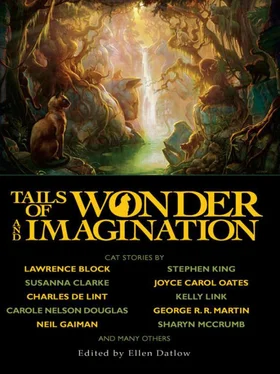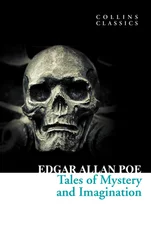Ellen Datlow - Tails of Wonder and Imagination
Здесь есть возможность читать онлайн «Ellen Datlow - Tails of Wonder and Imagination» весь текст электронной книги совершенно бесплатно (целиком полную версию без сокращений). В некоторых случаях можно слушать аудио, скачать через торрент в формате fb2 и присутствует краткое содержание. Год выпуска: 2010, ISBN: 2010, Издательство: Night Shade Books, Жанр: Фэнтези, Фантастика и фэнтези, Ужасы и Мистика, на английском языке. Описание произведения, (предисловие) а так же отзывы посетителей доступны на портале библиотеки ЛибКат.
- Название:Tails of Wonder and Imagination
- Автор:
- Издательство:Night Shade Books
- Жанр:
- Год:2010
- ISBN:978-1-59780-170-6
- Рейтинг книги:5 / 5. Голосов: 1
-
Избранное:Добавить в избранное
- Отзывы:
-
Ваша оценка:
- 100
- 1
- 2
- 3
- 4
- 5
Tails of Wonder and Imagination: краткое содержание, описание и аннотация
Предлагаем к чтению аннотацию, описание, краткое содержание или предисловие (зависит от того, что написал сам автор книги «Tails of Wonder and Imagination»). Если вы не нашли необходимую информацию о книге — напишите в комментариях, мы постараемся отыскать её.
collects the best of the last thirty years of science fiction and fantasy stories about cats from an all-star list of contributors.
Tails of Wonder and Imagination — читать онлайн бесплатно полную книгу (весь текст) целиком
Ниже представлен текст книги, разбитый по страницам. Система сохранения места последней прочитанной страницы, позволяет с удобством читать онлайн бесплатно книгу «Tails of Wonder and Imagination», без необходимости каждый раз заново искать на чём Вы остановились. Поставьте закладку, и сможете в любой момент перейти на страницу, на которой закончили чтение.
Интервал:
Закладка:
Mr. Muir watched Miranda methodically poison herself with an air not of elation as he’d anticipated, nor even with a sense of satisfaction in a wrong being righted, in justice being (however ambiguously) exacted—but with an air of profound regret. That the spoiled creature deserved to die he did not doubt; for after all, what incalculable cruelties, over a lifetime, must a cat inflict on birds, mice, and rabbits! But it struck him as a melancholy thing, that he, Julius Muir—who had paid so much for her, and who in fact had shared in the pride of her—should find himself out of necessity in the role of executioner. But it was something that had to be done, and though he had perhaps forgotten why it had to be done, he knew that he and he alone was destined to do it.
The other evening a number of guests had come to dinner, and as they were seated on the terrace Miranda leapt whitely up out of nowhere to make her way along the garden wall—plumelike tail erect, silky ruff floating about her high-held head, golden eyes gleaming—quite as if on cue, as Alissa said. “This is Miranda, come to say hello to you! Isn’t she beautiful!” Alissa happily exclaimed. (For she seemed never to tire of remarking upon her cat’s beauty—an innocent sort of narcissism, Mr. Muir supposed.) The usual praise, or flattery, was aired; the cat preened herself—fully conscious of being the center of attention—then leapt away with a violent sort of grace and disappeared down the steep stone steps to the river embankment. Mr. Muir thought then that he understood why Miranda was so uncannily interesting as a phenomenon: She represented a beauty that was both purposeless and necessary; a beauty that was (considering her pedigree) completely an artifice, and yet (considering she was a thing of flesh and blood) completely natural: Nature.
Though was Nature always and invariably— natural?
Now, as the white cat finished her meal (leaving a good quarter of it in the dish, as usual), Mr. Muir said aloud, in a tone in which infinite regret and satisfaction were commingled, “But beauty won’t save you.”
The car paused to look up at him with her flat, unblinking gaze. He felt an instant’s terror: Did she know? Did she know—already? It seemed to him that she had never looked more splendid: fur so purely, silkily white; ruff full as if recently brushed; the petulant pug face; wide, stiff whiskers; finely shaped ears so intelligently erect. And, of course, the eyes…
He’d always been fascinated by Miranda’s eyes, which were a tawny golden hue, for they had the mysterious capacity to flare up, as if at will. Seen at night, of course—by way of the moon’s reflection, or the headlights of the Muirs’ own homebound car—they were lustrous as small beams of light. “Is that Miranda, do you think?” Alissa would ask, seeing the twin flashes of light in the tall grass bordering the road. “Possibly,” Mr. Muir would say. “Ah, she’s waiting for us! Isn’t that sweet! She’s waiting for us to come home!” Alissa would exclaim with childlike excitement. Mr. Muir—who doubted that the cat had even been aware of their absence, let alone eagerly awaited their return—said nothing.
Another thing about the cat’s eyes that had always seemed to Mr. Muir somehow perverse was the fact that, while the human eyeball is uniformly white and the iris colored, a cat eyeball is colored and the iris purely black. Green, yellow, gray, even blue—the entire eyeball! And the iris so magically responsive to gradations of light or excitation, contracting to razor-thin slits, dilating blackly to fill almost the entire eye… As she stared up at him now her eyes were so dilated their color was nearly eclipsed.
“No, beauty can’t save you. It isn’t enough.” Mr. Muir said quietly. With trembling fingers he opened the screen door to let the cat our into the night. As she passed him—perverse creature, indeed!—she rubbed lightly against his leg as she had not done for many months. Or had it been years?
Alissa was twenty years Mr. Muir’s junior but looked even younger: a petite woman with very large, very pretty brown eyes; shoulder-length blond hair; the upbeat if sometimes rather frenetic manner of a well-practiced ingenue. She was a minor actress with a minor ambition—as she freely acknowledged—for alter all, serious professional acting is brutally hard work, even if one somehow manages to survive the competition.
“And then, of course, Julius takes such good care of me,” she would say, linking her arm through his or resting her head for a moment against his shoulder. “I have everything I want, really, right here…” By which she meant the country place Mr. Muir had bought for her when they were married. (Of course they also kept an apartment in Manhattan, two hours to the south. But Mr. Muir had grown to dislike the city—it abraded his nerves like a cat’s claws raking against a screen—and rarely made the journey in any longer.) Under her maiden name, Howth, Alissa had been employed intermittently for eight years before marrying Mr. Muir; her first marriage—contracted at the age of nineteen to a well-known (and notorious) Hollywood actor, since deceased—had been a disaster of which she cared not to speak in any detail. (Nor did Mr. Muir care to question her about those years. It was as if, for him, they had not existed.)
At the time of their meeting Alissa was in temporary retreat, as she called it, from her career. She’d had a small success on Broadway but the success had not taken hold. And was it worth it, really, to keep going, to keep trying? Season after season, the grinding round of auditions, the competition with new faces, “promising ”new talents… Her first marriage had ended badly and she’d had a number of love affairs of varying degrees of worth (precisely how many Mr. Muir was never to learn), and now perhaps it was time to ease into private life. And there was Julius Muir: not young, not particularly charming, but well-to-do, and well-bred, and besotted with love for her, and— there.
Of course Mr. Muir was dazzled by her; and he had the time and the resources to court her more assiduously than any man had ever courted her. He seemed to see in her qualities no one else saw; his imagination, for so reticent and subdued a man, was rich, lively to the point of fever, immensely flattering. And he did not mind, he extravagantly insisted, that he loved her more than she loved him—even as Alissa protested she did love him—would she consent to marry him otherwise?
For a few years they spoke vaguely of “starting a family,” but nothing came of it. Alissa was too busy, or wasn’t in ideal health; or they were traveling; or Mr. Muir worried about the unknown effect a child would have upon their marriage. (Alissa would have less time for him, surely?) As time passed he vexed himself with the thought that he’d have no heir when he died—that is, no child of his own—but there was nothing to be done.
They had a rich social life; they were wonderfully busy people. And they had, after all, their gorgeous white Persian cat. “Miranda would be traumatized if there was a baby in the household,” Alissa said. “We really couldn’t do that to her.”
“Indeed we couldn’t,” Mr. Muir agreed.
And then, abruptly, Alissa decided to return to acting. To her “career” as she gravely called it—as if it were a phenomenon apart from her, a force not to be resisted. And Mr. Muir was happy for her—very happy for her. He took pride in his wife’s professionalism, and he wasn’t at all jealous of her ever-widening circle of friends, acquaintances, associates. He wasn’t jealous of her fellow actors and actresses—Rikka, Mario, Robin, Sibyl, Emile, each in turn—and now Alban of the damp, dark, shiny eyes and quick sweet smile; nor was he jealous of the time she spent away from home; nor, if home, of the time she spent sequestered away in the room they called her studio, deeply absorbed in her work. In her maturity Alissa Howth had acquired a robust sort of good-heartedness that gave her more stage presence even as it relegated her to certain sorts of roles—the roles inevitable, in any case, for older actresses, regardless of their physical beauty. And she’d become a far better, far more subtle actress—as everyone said.
Читать дальшеИнтервал:
Закладка:
Похожие книги на «Tails of Wonder and Imagination»
Представляем Вашему вниманию похожие книги на «Tails of Wonder and Imagination» списком для выбора. Мы отобрали схожую по названию и смыслу литературу в надежде предоставить читателям больше вариантов отыскать новые, интересные, ещё непрочитанные произведения.
Обсуждение, отзывы о книге «Tails of Wonder and Imagination» и просто собственные мнения читателей. Оставьте ваши комментарии, напишите, что Вы думаете о произведении, его смысле или главных героях. Укажите что конкретно понравилось, а что нет, и почему Вы так считаете.












